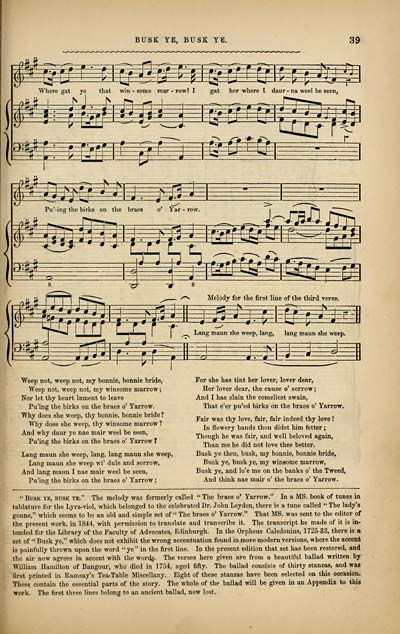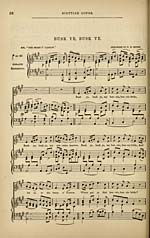Inglis Collection of printed music > Printed music > Songs of Scotland adapted to their appropriate melodies > Volume 1
(55) Page 39
Download files
Complete book:
Individual page:
Thumbnail gallery: Grid view | List view

BUSK YE, BUSK YE.
39
fe«
^B
m^E^wsmmws
^
£=w
y~\?
P=S
Where gat ye that win - some mar - row? I gat her where I daur - na weel be seen,
tf=d=£i
^^^^^^^^
'^m
B#£
¥^i^
^c
f ^^ E
i
^^m^j
Pu'-ing the birks on the brae9 o' Yar - row
m^
.waD
jggs^ ^j
^B
Melody for the first line of the third verse.
mmmm^
Lang maun she weep, lang, lang maun she weep.
^^m
^m
-e>
Weep not, weep not, my bonnie, bonnie bride,
Weep not, weep not, my winsome marrow ;
Nor let thy heart lament to leave
Pu'ing the birks on the braes o' Yarrow.
Why does she weep, thy bonnie, bonnie bride ?
Why does she weep, thy winsome marrow ?
And why daur ye nae mair weel be seen,
Pu'ing the birks on the braes o' Yarrow ?
Lang maun she weep, lang, lang maun she weep,
Lang maun she weep wi' dule and sorrow,
And lang maun I nae mair weel be seen,
Pu'ing the birks on the braes o' Yarrow ;
For she has tint her lover, lover dear,
Her lover dear, the cause o' sorrow ;
And I hae slain the comeliest swain,
That e'er pu'ed birks on the braes o' Yarrow.
Fair was thy love, fair, fair indeed thy love !
In flowery bands thou didst him fetter ;
Though he was fair, and well beloved again,
Than me he did not love thee better.
Busk ye then, busk, my bonnie, bonnie bride,
Busk ye, busk ye, my winsome marrow,
Busk ye, and lo'e me on the banks o' the Tweed,
And think nae mair o' the braes o' Yarrow.
" Busk te, busk te." The melody was formerly called " The braes o' Yarrow." In a MS. book of tunes in
tablature for the Lyra-viol, which belonged to the celebrated Dr. John Leyden, there is a tune called " The lady's
goune," which seems to be an old and simple set of " The braes o' Yarrow." That MS. was sent to the editor of
the present work, in 1844, with permission to translate and transcribe it. The transcript he made of it is in-
tended for the Library of the Faculty of Advocates, Edinburgh. In the Orpheus Caledonius, 1725-33, there is a
set of " Busk ye," which does not exhibit the wrong accentuation found in more modern versions, where the accent
is painfully thrown upon the word "ye" in the first line. In the present edition that set has been restored, and
the air now agrees in accent with the wordj. The verses here given are from a beautiful ballad written by
William Hamilton of Bangour, who died in 1754, aged fifty. The ballad consists of thirty stanzas, and was
first printed in Ramsay's Tea-Table Miscellany. Eight of these stanzas have been selected on this occasion.
These contain the essential parts of the story. The whole of the ballad will be given in an Appendix to this
work. The first three lines belong to an ancient ballad, now lost.
39
fe«
^B
m^E^wsmmws
^
£=w
y~\?
P=S
Where gat ye that win - some mar - row? I gat her where I daur - na weel be seen,
tf=d=£i
^^^^^^^^
'^m
B#£
¥^i^
^c
f ^^ E
i
^^m^j
Pu'-ing the birks on the brae9 o' Yar - row
m^
.waD
jggs^ ^j
^B
Melody for the first line of the third verse.
mmmm^
Lang maun she weep, lang, lang maun she weep.
^^m
^m
-e>
Weep not, weep not, my bonnie, bonnie bride,
Weep not, weep not, my winsome marrow ;
Nor let thy heart lament to leave
Pu'ing the birks on the braes o' Yarrow.
Why does she weep, thy bonnie, bonnie bride ?
Why does she weep, thy winsome marrow ?
And why daur ye nae mair weel be seen,
Pu'ing the birks on the braes o' Yarrow ?
Lang maun she weep, lang, lang maun she weep,
Lang maun she weep wi' dule and sorrow,
And lang maun I nae mair weel be seen,
Pu'ing the birks on the braes o' Yarrow ;
For she has tint her lover, lover dear,
Her lover dear, the cause o' sorrow ;
And I hae slain the comeliest swain,
That e'er pu'ed birks on the braes o' Yarrow.
Fair was thy love, fair, fair indeed thy love !
In flowery bands thou didst him fetter ;
Though he was fair, and well beloved again,
Than me he did not love thee better.
Busk ye then, busk, my bonnie, bonnie bride,
Busk ye, busk ye, my winsome marrow,
Busk ye, and lo'e me on the banks o' the Tweed,
And think nae mair o' the braes o' Yarrow.
" Busk te, busk te." The melody was formerly called " The braes o' Yarrow." In a MS. book of tunes in
tablature for the Lyra-viol, which belonged to the celebrated Dr. John Leyden, there is a tune called " The lady's
goune," which seems to be an old and simple set of " The braes o' Yarrow." That MS. was sent to the editor of
the present work, in 1844, with permission to translate and transcribe it. The transcript he made of it is in-
tended for the Library of the Faculty of Advocates, Edinburgh. In the Orpheus Caledonius, 1725-33, there is a
set of " Busk ye," which does not exhibit the wrong accentuation found in more modern versions, where the accent
is painfully thrown upon the word "ye" in the first line. In the present edition that set has been restored, and
the air now agrees in accent with the wordj. The verses here given are from a beautiful ballad written by
William Hamilton of Bangour, who died in 1754, aged fifty. The ballad consists of thirty stanzas, and was
first printed in Ramsay's Tea-Table Miscellany. Eight of these stanzas have been selected on this occasion.
These contain the essential parts of the story. The whole of the ballad will be given in an Appendix to this
work. The first three lines belong to an ancient ballad, now lost.
Set display mode to: Large image | Transcription
Images and transcriptions on this page, including medium image downloads, may be used under the Creative Commons Attribution 4.0 International Licence unless otherwise stated. ![]()
| Special collections of printed music > Inglis Collection of printed music > Printed music > Songs of Scotland adapted to their appropriate melodies > Volume 1 > (55) Page 39 |
|---|
| Permanent URL | https://digital.nls.uk/94707632 |
|---|
| Shelfmark | Ing.127 |
|---|---|
| Additional NLS resources: | |
| Attribution and copyright: |
|
| Description | Scottish and English songs, military music and keyboard music of the 18th and 19th centuries. These items are from the collection of Alexander Wood Inglis of Glencorse (1854 to 1929). Also includes a few manuscripts, some treatises and other books on the subject. |
|---|
| Description | The Glen Collection and the Inglis Collection represent mainly 18th and 19th century Scottish music, including Scottish songs. The collections of Berlioz and Verdi collected by bibliographer Cecil Hopkinson contain contemporary and later editions of the works of the two composers Berlioz and Verdi. |
|---|

